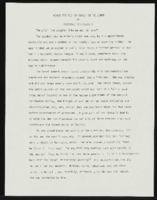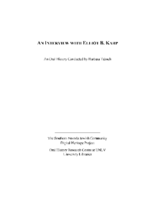Search the Special Collections and Archives Portal
Search Results

Transcript of interview with Lawrence Hawley by Andy Sturgeon, March 13, 1981
Date
Archival Collection
Description
On March 13, 1981, Andy Sturgeon interviewed attorney Lawrence Hawley in his office on 302 East Carson Street, Las Vegas, Nevada. The two discuss how Hawley first came to Nevada, as well as his personal family history. Hawley describes Hoover Dam as it was being built, the effects of the Depression on Nevada, and how Las Vegas has grown in size. Hawley also discusses liquor laws and how practicing law has changed since he first moved to Nevada.
Text

Transcript of interview with William E. "Bilbo" Helms by Denise Wolff, March 4, 1980
Date
Archival Collection
Description
On March 4, 1980, collector Denise Wolff interviewed truck driver and teacher, William E. “Bilbo” Helms (born on December 7th, 1932 in Memphis, Tennessee) in an office room at Bonanza High School in Las Vegas, Nevada. This interview covers the transformation, growth, and development of the public education system in Las Vegas, Nevada.
Text

Transcript of interview with Ann K. Johnson by Wanda Cortés, March 3, 1980
Date
Archival Collection
Description
On March 3, 1980, Wanda Cortés interviewed University of Nevada, Las Vegas counselor, Ann K. Johnson (born August 28th, 1954 in Garland, Arkansas) about her life in Southern Nevada. The two discuss Johnson’s educational and occupational history. The interview concludes with a discussion on the population’s rapid growth during the seventies.
Text

Aracely Rascon oral history interview: transcript
Date
Archival Collection
Description
Oral history interview with Aracely Rascon conducted by Claytee D. White on October 2, 2018 for the Remembering 1 October Oral History Project. In this interview, Rascon recalls her early childhood in Chihuahua, Mexico and until her father brought the family to Las Vegas, Nevada. She studied interior design at the University of Nevada, Las Vegas (UNLV) and joined the firm of Simpson Coulter, where she specializes in decorating the interiors of businesses and schools. Two weeks after the October 1, 2017 shooting, her skills were called upon by those across the city who were preparing the Resiliency Center for survivors of the mass shooting. This proposed Resiliency Center needed carpet, paint, furniture, art work, and everything else to make it into a place where people could seek assistance in a peaceful atmosphere where they could tell their stories and ask for help. Rascon contacted all her resources and was pleasantly surprised when each company bent over backwards to offer deals, advice, and referrals. Rascon learned that she could use her talents and decorating skills to help others be at peace and to dialogue and perform in comfort. She will never forget and will be forever grateful to the sense of community displayed by her city.
Text

"Never Too Old To Forget Or To Learn": short story by Roosevelt Fitzgerald
Date
Archival Collection
Description
From the Roosevelt Fitzgerald Professional Papers (MS-01082) -- Short stories and poems by Roosevelt Fitzgerald file.
Text

Interview with Stephen Craig Ronshaugen, November 26, 2004
Date
Archival Collection
Description
Text

Interview with Native American Forum on Nuclear Issues, April 10, 2008
Date
Archival Collection
Description
Text

Interview with Bruce Walter Church, April 27, 2004
Date
Archival Collection
Description
Access note: May not quote in any form without written permission from interviewee
Text

Transcript of interview with Elliot B. Karp by Barbara Tabach, December 17, 2014
Date
Archival Collection
Description
Interview with Elliot B. Karp by Barbara Tabach on December 17, 2014. In this interview, Elliot Karp discusses growing up in a culturally Jewish household in New York and becoming more observant in his teenage and college years. He decided, after a trip to Israel and a year in a rabbinical program, that he wanted to be a "Jewish professional" with a focus on social work and community organizing, and attended a Master's program at Brandeis University. Karp goes on to talk about his work for the Jewish Federation in Ohio and Pennsylvania, and being recruited to come to Las Vegas. He talks about the challenges in the Las Vegas Jewish community and the Jewish Federation's role as an umbrella organization to partner with other agencies to grow and sustain a robust Jewish community in Southern Nevada.
On October 6, 1955, Elliot Karp was born in Mineola, New York to parents of East European heritage who identified as culturally Jewish. As a teenager, Elliot felt the calling to become kosher, balancing this practice with household norms that were not as strict. He eventually became shomer Shabbat just after enrolling at State University of New York at Stony Brook, where he majored in Political Science. After graduating from SUNY, Elliot spent a year living in Israel considering a path in rabbinical studies. By the end of his time, he decided on a different, yet related path, and registered as a graduate student in Brandeis University's School of Jewish Communal Service, on fellowship from Council of Jewish Federations. After graduating, Elliot moved to Columbus, Ohio to work for the Jewish Federation, focusing on fundraising, but was exposed to many different operational areas of the organization. After three years, Elliot was recruited to the Philadelphia office as its director of leadership development. He then left the Federation to work in development at Brandeis University, but after two years, returned to the Federation as the Cincinnati office's chief development officer. In 2008, Elliot received a call to take his highly cultivated leadership and fundraising skills to another Federation office: Las Vegas. After much consideration, he took the job - and challenge - as the office's new chief executive officer. Since then, Elliot has done much to promote communication, coordination and collaboration within the local Jewish community and beyond, through relationship building and successful fundraising efforts. His ultimate desire is to expand funding for programs that get more people involved in Jewish life - while also empowering community members define what a Jewish life means for them.
Text

Transcript of interview with Wilma and Burt Bass by Barbara Tabach, February 9 , 2015
Date
Archival Collection
Description
In 1939, Wilma (Frank) Bass was born in New York City, where she began her involvement in theater at the age of ten. Almost twenty years later, she met Burt Bass (1932- ) when both worked for a photography studio, one of Burt first post-high school jobs. Burt opened his first professional photography studio in 1962, shortly after he married Wilma in 1960. The couple soon had two daughters – Jill and Wendy – and moved to Las Vegas in 1974. Burt initially worked for his brother-in-law Ed Frank's check cashing businesses and later opened his own photography business, Burton Studio. He later added services such as fingerprinting, background checks, and photographs for identification cards. Wilma worked as a jewelry salesperson, first at the Gold Factory then at Nieman Marcus. Socially, she was very involved with Temple Beth Sholom’s Sisterhood, using her theater talents to write, direct and produce various shows for the Sisterhood, ORT as well as B’nai B’rith Youth Organization. In this interview, Burt discusses his photography business, the migration of its storefront around town, and his colorful landlords, including individuals like Moe Dalitz and Art Marshall. Wilma talks about her sales career in the local jewelry industry, and more extensively, she shares memories of her involvement in the Jewish community with theater productions. Much of the discussion revolved around related news articles and personal photos from their relationships and activities within the Jewish community. The couple also shares stories of friendships with local entertainers, including Jerry Lewis and Neil Sedaka.
Text
